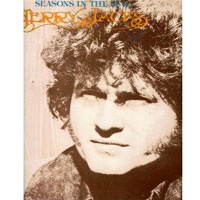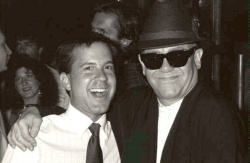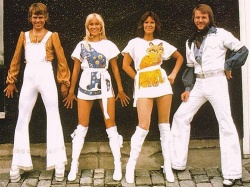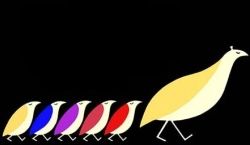|
Part One
Part Two

Other stories ended up a little better, like the one which inspired the
title of Scott’s book of interviews, “We had Joy, We had Fun: The Lost
Recording Artist of the ‘70s.” That story is about Terry Jacks, the man
who wrote and sang the ‘70s monster-hit “Seasons in the Sun.” Scott
recalls the story. “He made enough money off that record that he
financed his entire life on it. It sold 10 million copies; it was the
biggest selling song of the ‘70s, single-wise. He has a boat now called
‘Seasons in the Sun,’ and he lives off the coast of Canada and he fishes
all day, and he doesn’t have to do anything.” Scott laughs, “He had a
pretty good deal.”
There are many people that Scott would still like to interview, but the
one that got away is Elton John. “I met Elton John in 1987. We met and
talked, and I told him about my show.” Scott explained the premise of
the show, and how he’d play many of John’s lesser-known hits. As it
happens, John was also a record collector, and used to collect every 45
that made the English charts. John loved the description of the show,
and agreed to schedule an interview through his management. “But his
management never responded or said yes,” says Scott. “So he is one I’d
still like to interview.”
As it happens, getting through an artist’s management is consistently the hard part of getting these interviews. “A lot of people
take the title of my show wrong,” says Scott. “Stevie Wonder doesn’t
want to be known as a Lost 45 artist. Some of these people don’t, and I
have to show them that the appreciation I have for the music is not that
they’re lost, but that the artists are still around today and learning
what they’re up to.” Scott makes a point to always give an artist the
opportunity to talk about what they’ve been doing since their Lost 45s
hit. “I always give them a chance to talk about current projects,
because most of them are still in the business.”
THE FUTURE OF THE LOST 45s, AND OF RADIO ITSELF
***
With the show going strong and now entering into its third decade, Scott
has no plans of stopping anytime soon. His hope is to let the show
evolve as the years pass, letting the
 rotation
creep into including songs from the ‘80s and ‘90s. “Singles were
released regularly until 1990, and then they petered out, so I think I’d
have problems doing 45s much past ’90 or ’91. I can’t see myself playing
songs from much after that. But that still leaves me quite a bit of time
to grow into
playing mid-70’s ‘80s and ‘90s music.” rotation
creep into including songs from the ‘80s and ‘90s. “Singles were
released regularly until 1990, and then they petered out, so I think I’d
have problems doing 45s much past ’90 or ’91. I can’t see myself playing
songs from much after that. But that still leaves me quite a bit of time
to grow into
playing mid-70’s ‘80s and ‘90s music.”
One might think it would be challenging to keep the show fresh for all
these years, and for years to come, but the fans take care of that. “The
listeners keep the show fresh for me,” says Scott. “They come up with
ideas and themes that I would never have thought of.”
“I had to do the oldies format this winter because there was a blizzard
and no one could get in, and it wasn’t as exciting,” says Scott. “I’ve
got to hand it to them for making those songs sound fresh, that’s an
art. If anything, my show’s easy because the songs are fresh. Playing
“Hey Jude” for the billionth time, and making it sound different or
saying something about it that no one knows, that’s hard.”
Scott says that he’d like to do the show until he retires, and
eventually to donate the collection. “I’ve never really thought about it
as preserving it for the next generation or anything,” says Scott.
“Whoever gets my record library in the end will probably preserve all
the songs that made the Top 40, which is kind of neat.”
He takes more pride in knowing that the songs are being heard by younger
generations today. “I’ve heard from a lot of kids who weren’t even alive
when this music was out who really have a fondness for it,” says
Scott. “I think there’re a couple generations listening to it and liking
it.”
But what will happen to these lost songs when their keeper leaves the
business? “I think what’s going to happen is exactly what happened to
‘50s music,” says Scott. “It’s going to disappear, unfortunately. Even
oldies aren’t playing 50’s music anymore. So the music my parents grew
up on, they express how hard it is to find it on the radio now. So they
buy it on CD or get it on Satellite radio.”
Even terrestrial radio is being influenced by Satellite and Internet.
The new “Jack” format has now hit the airwaves of Boston, in the form of
93.7 Mike FM. The station plays all the songs “that you would download
if you had the time to,” (as described by their website), but with no
DJ’s. However, Scott thinks the format isn’t the answer if terrestrial radio
is to compete with Satellite and Internet radio.

“If what you want to hear is just a jukebox of songs, then the Internet
and Satellite are fine,” says Scott. “But most people have proven that
audiences want to hear some sort of DJ interaction, and they want to
hear someone say a fact about a song, and that is what is largely
missing on Internet and Satellite: knowledgeable DJ’s who actually know
what they’re talking about.”
To truly compete, terrestrial radio will have to return to its roots in
format and style, while taking full advantage of the added features that
could be offered to audiences through the new digital signal. Most of us
have seen the song titles and artist names showing up on our car
stereos. The same technology, combined with the Web, could enable
listeners to rate songs or otherwise communicate instantly with the DJ
to influence play lists, or even purchase songs digitally the instant
that they hear them on the radio. This kind of additional income for
stations could help offset the likely loss of revenue associated with
reducing commercial time from 14 minutes per hour down to 10 or 11, a
likely necessary move to keep the attention of listeners.
“The land-based radio stations are going to have to wake up if they’re
going to compete with IPods, the Internet and Satellite radio,” says
Scott. “I think I’m fortunate that I am providing some sort of different
programming at a time when terrestrial radio needs different
programming. Eventually all the boring stuff is going to have be
changed. They’re gonna have to do more exciting radio, and go back to
the way it used to be. More production, more fun formats, and throwing
out some of the rules and regulations and research that they do.
Otherwise, they’re gonna lose.”
Scott is likely to have a secure place in radio for years to come, as
other stations move to offer the kind of experience that The Lost 45s
already does, even if those same industry insiders don’t always get it
today. “I get this a lot from radio people. They don’t think the show
should be successful at all.”
 But consistently the Lost 45s has been successful, and Scott is all too
modest in his explanation as to why. “Since this is the only outlet for
these songs anywhere on the dial, I think I win by default,” says Scott.
“I do really hard work on the show, but all the other radio stations are
making it easier for me because they’re avoiding these songs entirely.
As long as they all keep doing that, my job is easier. I hate to say
that, because it minimizes my part in it, but it’s the only outlet. If
you play these songs, people are gonna come.” But consistently the Lost 45s has been successful, and Scott is all too
modest in his explanation as to why. “Since this is the only outlet for
these songs anywhere on the dial, I think I win by default,” says Scott.
“I do really hard work on the show, but all the other radio stations are
making it easier for me because they’re avoiding these songs entirely.
As long as they all keep doing that, my job is easier. I hate to say
that, because it minimizes my part in it, but it’s the only outlet. If
you play these songs, people are gonna come.”
But the fact is the show is number one for more reasons than just what
other shows aren’t doing. The Lost 45s is active and fun, and has been
able to create a real experience for its listeners, right down to the
authentic commercials from the ‘70s and ‘80s slipped in between the
songs for effect. These little touches, added together with artist
interviews and stories from long ago, not to mention thousands of great
songs, have kept listeners tuning in week after week for decades. And as
long as fans keep coming back to hear those lost and beloved songs once again, Barry Scott is happy to keep spinning them. “I like what I
play. I think I’d listen to this show if it wasn’t me.”

PREVIOUS SECTION
Part One
Part Two
To learn
more about Barry Scott,
visit his
website at:
http://www.lost45.com/
|